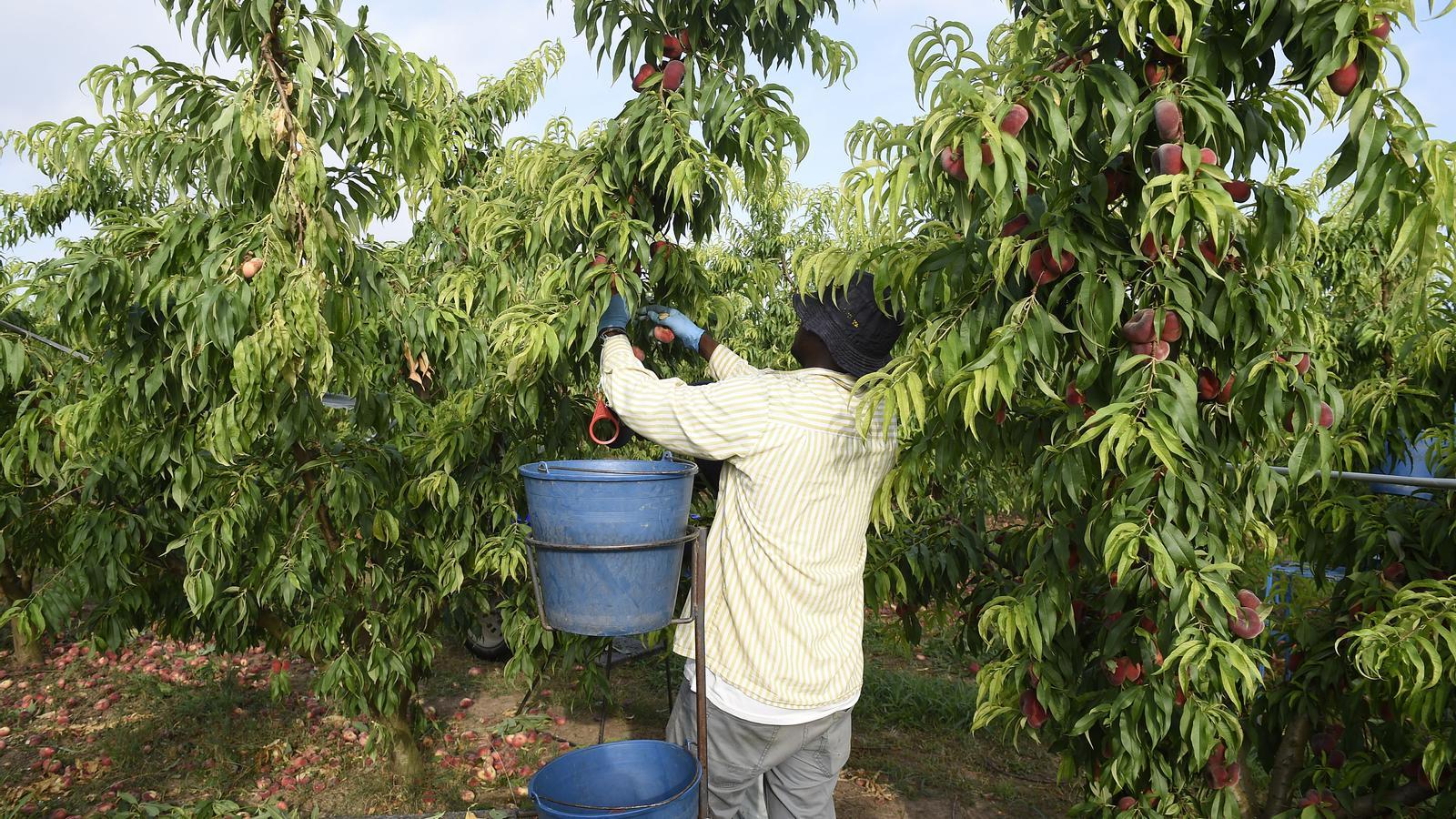A seasonal worker dies in Alcarràs during the peak of the heat wave.
The man began to feel ill while harvesting fruit on a farm in Segrià.

BarcelonaA seasonal worker died this Monday afternoon while harvesting fruit on a farm in Alcarràs, in the Segrià region, according to ACN reports and ARA. The Mossos d'Esquadra (Catalan police) were alerted around 4:45 p.m., coinciding with the peak of the heat wave and when the temperature in the municipality was around 41 degrees. According to ACN, the man reportedly became dizzy and began to feel ill. Emergency Medical System (SEM) officers were dispatched to a nearby farm where the seasonal worker was working, but when they arrived, he showed no vital signs and they were unable to revive him.
However, police sources insist that they must wait for the results of the autopsy to clarify whether it was an occupational accident or not. In fact, the autopsy will also determine whether the man's death was related to heat exhaustion or the effects of high temperatures, or whether it was due to a pre-existing condition.
"Insufficient" changes to protect workers
Although some measures have been taken to protect farm workers from high temperatures, a spokesperson for the organization Fruta con Justícia Social criticizes them for being insufficient. "We are surprised by what people were doing working in 41 degrees, when what we need to do is reorganize schedules." Speaking to ARA, he notes that more and more companies are trying to reorganize schedules to avoid workers being exposed to the hottest hours, but criticizes that this ends up being "make-believe" if employees are not guaranteed access to fresh water to hydrate throughout the day.
Regarding schedules, he points out the difficulty of reorganizing the workday to avoid the hottest hours, considering that the workday in the fields can typically be around 10 hours. "You can't distribute 10 hours of work during a heat wave, even if you start at 5:00 a.m. We think that's insufficient. Maybe they don't work at 1:00 p.m. or 2:00 p.m., but working at 12:30 p.m. is just as dangerous."
UGT of Catalonia and UGT FICA, the federation that represents agricultural workers, also lamented the death of the seasonal worker. Pending the results of the autopsy, the union called for an "exhaustive" investigation into the events and demanded that the administration "intensify" labor inspections in a time when "high temperatures pose a serious risk to the health" of workers, especially in agriculture. They also demand that, if necessary, outdoor activities be halted. "The most important thing, and what we demand regarding outdoor work, is the lack of awareness among many agricultural employers regarding their responsibilities regarding health and safety at work," explains Antònia Fuentes, secretary of union action for UGT FICA in Catalonia.
In 2023 the Spanish government introduced a decree law to strengthen protection for outdoor work, according to which it is prohibited to perform certain tasks if the State Meteorological Agency (Aemet) has activated the orange or red alert for high temperatures. "This change already established clear and simple guidelines for risk assessment considering adverse weather conditions. Only by applying consistency, we all know that in Lleida, with a brutal heat wave of over 40 degrees, working with physical effort is unhealthy," Fuentes insists. The unionist urges us to foresee and prevent these situations to avoid regrettable news like the death of this seasonal worker. She also regrets that the Labor Inspectorate does not have enough personnel to cover the entire business sector and verify that minimum safety standards are met on agricultural holdings.
Sources from the CCOO (Working Council of Catalonia) also insist that it is "very difficult" to ensure that the rights of these workers, the majority of whom are migrants who are "afraid" to report their precarious working conditions, are not violated. "There are many people who don't provide water or a hat to protect themselves," the union explains. They also note that some companies have modified schedules to start earlier, but they believe this is not a widespread practice. "There are no companies that stop work because their superiors are in a hurry and are concerned about how much fruit is needed in the warehouses or if it is rotting on the trees," these same sources report.
The mayor of Alcarràs, Jordi Castany, lamented the events and noted that the cause of death has not yet been determined. At the same time, the mayor highlighted the efforts of the municipality's agricultural companies to adapt work to the high temperatures. Castany explained in statements to ACN that they are increasingly trying to carry out intensive workdays between early morning and two in the afternoon, with a break to rest and refresh, always ensuring that workers have water available.
